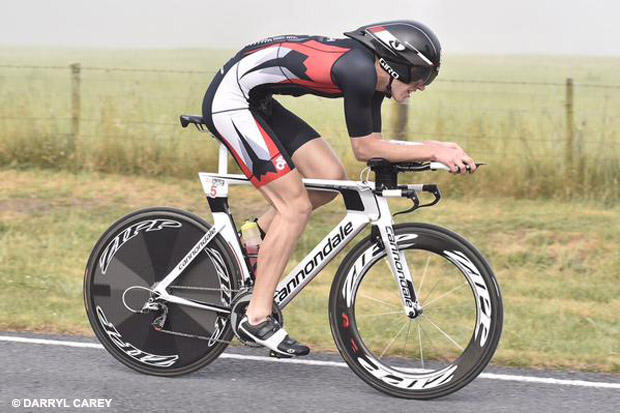A chat with Mark Bowstead
In 2009, Mark Bowstead signaled he was a force to be reckoned as he won the 20-24 age group at the ITU long distance World Championship and New Zealand’s prestigious non-drafting Olympic distance Tinman Triathlon. The next year he won the first of three straight at the Auckland Half Ironman. And last year, he won the Taupo half, was 2nd at the Tauranga half, and had a solid U.S. season with 4th place finishes a Buffalo Springs 70.3, Tri Rock Philadelphia, and the Boulder Peak 5i50 as well as a 5th at New Orleans 70.3.
So far his ace in the hole is the bike as he has set fastest bike splits at many races including the 2014 Taupo half and the Tauranga half, and this year at Ironman 70.3 Geelong and the Ironman 70.3 Asia-Pacific Championship in Auckland.
After posting an encouraging 32:41 PB in the 10k at Hy-Vee last year, he has whittled down his 70.3 runs from the 1:18 to 1:19 range to a 1:15 to 1:17 average and sees better in his future thanks in part to several training sessions back home with Cam Brown and under the guidance of coach Nathan Richmond, who has a long term plan for the 25-year-old on the rise.
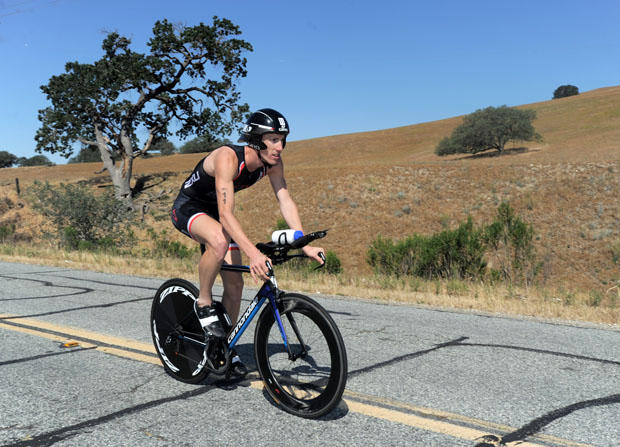
Slowtwitch: What led you to become a professional triathlete?
Mark Bowstead: I decided I wanted to be a professional triathlete half way through my engineering degree [at the University of Auckland] when I had a string of amateur triathlon successes.
ST: Did you finish school?
Mark: I continued with my degree [first honors] as I knew it was the right thing to do to have a backstop, therefore did not do the whole come up through ITU scenarios. But now I have finished university and I want to give being a professional triathlete a crack. I love sport and can’t see myself doing anything else, so I will give it my all.
ST: What led you to Wildflower?
Mark: Wildflower has been on my bucket list. I am a big fan of Terenzo [Bozzone] and he still holds the record there [3:53:43]. Everyone has told me how hard it is and so I’ve always wanted to come here and see. I did St George 70.3 last year. It was tough. And it’s a race that is basically like a world champs. I am not quite at that stage in my career to be competitive in a world champs sort of field. So this year I wanted to come here and try and make some money. And I love tough courses, so I’m excited. Driving in yesterday I saw the hills and I was thinking this could be the toughest race I’ve done.
ST: What respect do Kiwis give Terenzo for his course record at Wildflower?
Mark: I am good friends with Terenzo. I think he rates this potentially one of his best athletic performances. I don’t know if has been able to replicate anywhere else the way he destroyed the record, the field and the course that year. I know his coaches at that point were just blown away because it came at a time when he was trying to make the Olympics for New Zealand – which I believe he should have. So what he did at Wildflower was a surprise and it has been inspirational.
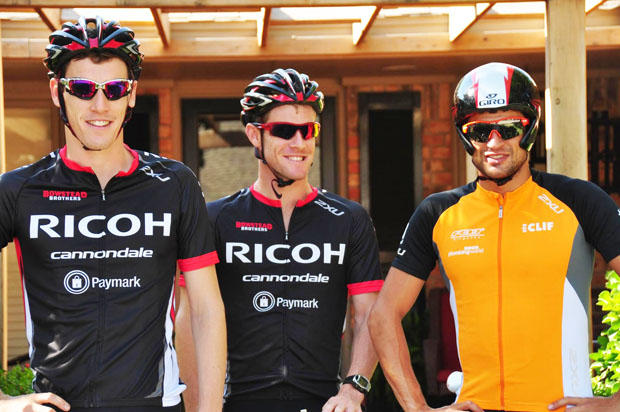
ST: You mentioned you are not ready in your career to compete at World Championships. But it seems that one of you disciplines is ready now – the bike.
Mark: The bike has always been one of my strengths. I feel I am at the semi top level. Not quite top top on the bike. But I feel I can ride with most of the guys. It is just a goal of running super-fast now. For example, Tim Reed is a phenomenal cyclist as well now and he will run 1:12 on his day. So that’s what I’ve got to do.
ST: What are your usual run splits at the half?
Mark: Last year it was 1:18 and at Geelong it was 1:17. New Orleans 70.3 was 1:18 on what I consider a couple minutes slow course. At a tough local Ironman 70.3 in New Zealand I ran a 1:15, which gave me a lot of confidence. I won that race by 20 minutes so I was wasn’t pushed and I felt I had more. But what was more important, I rode at 325 watts (normalized) before I ran that 1:15 split.
ST: How strong is a 325 watts race average for you?
Mark: That was a little high because it was a course like Wildflower. It had 1500 meters of elevation. That always brings up the power. To be honest I like hilly courses because I feel I can recover pretty quickly on the descents and I can keep on pushing
ST: Are you a fearless downhiller?
Mark: Unfortunately, I have no claim to being a good descender. I had a really bad crash 18 months ago back home in New Zealand. I was training with Cam Brown, my brother James Bowstead and another mate. We were going downhill at 55 km/h and I hit an oil slick. My front wheel went out and I went down and took out my brother James and Cam Brown veered into a ditch. I came down really heavy on my right hip. It didn’t seem so bad at the time. But it took so much skin off it got infected and didn’t heal very well. I couldn’t train for 5-6 weeks after.
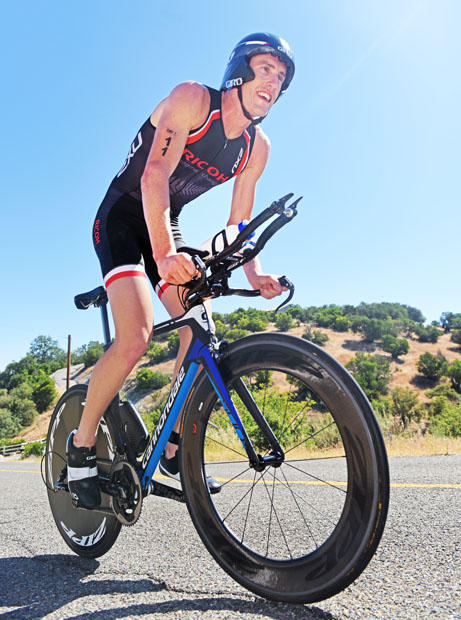
ST: What happened to Cam Brown?
Mark: Cam was lucky/skilled. His bike handling skills paid off. He went into the ditch but he stayed up. He does some mountain biking in the off season with his kids so that definitely showed.
ST: Did it leave some mental scars?
Mark: Definitely. Cornering to the right I am a little bit more conservative than cornering to my left. You can’t see it when I am dressed or in my race kit. But my scar was massive. So I take the cautious approach. Get off the bike and I am happy sort of thing in terms of safety and not getting a flat.
ST: Cycling is still your strength?
Mark: Yes definitely. Also, with my new Cannondale Slice I feel a lot more confident. It handles better than the RS which is a pure aero super bike. I was on the Cannondale RS when I crashed and I had been riding it for two years. The RS is the one that pro Tours riders use. Basically you needed an on board mechanic to travel with you – which I don't think many triathletes have. The Slice may not be absolutely perfect in terms of a “super bike.” But it is reliable and on a course like Wildflower I think it is fast. It is probably the lightest TT bike there is. So that is beneficial. And it is more adjustable. I feel I am in in a better position, which makes me faster.
ST: What have been your most encouraging finishes the last year and half?
Mark: Hy-Vee 2014 was encouraging in that I ran my fastest 10k which was 32:41 [while finishing 20th]. The run has been my weakness. I have been improving working with Nathan Richmond (2004 Olympian and 1995 ITU World Junior Champion) and it was exciting to run that fast.
ST: What happened after that?
Mark: Then I went home and won the Taupo Half Ironman. Graham O’Grady was second by about 5 minutes, which was encouraging as he is a very good athlete. I also got the bike course record [2:11:28 – 4 minutes faster than his brother] which was nice. Over the New Zealand summer, at the Asia-Pacific Ironman 70.3 champs in Auckland near my home town, I led off the bike by 1:40, which was exciting. And I held the lead led for 8 or 9k until Tim Reed came flying past. I finished 7th against a very competitive field.
ST: All those behind you were benefiting from legally spaced aerodynamic advantages while you were riding alone?
Mark: Yes. So it was discouraging to see them all run by. But I backed that up at the Australian pro champs at Geelong 70.3 a few weeks later. I got the fastest bike split again. Crowie, Sam Appleton and I rode together (Sam was so strong!) and got a big lead and I ended up 3rd. That was my first 70.3 podium, so I was very happy.
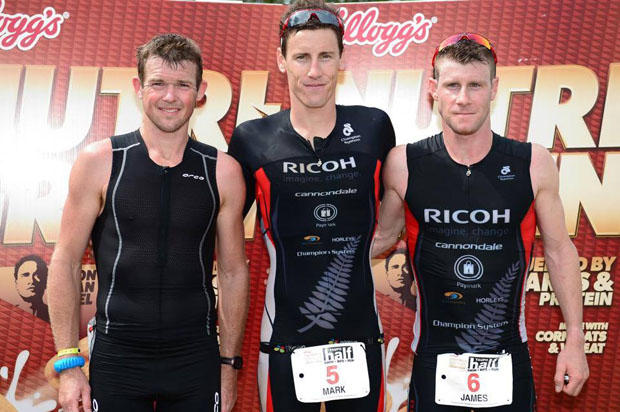
ST: What is your potential? You have a good PR in the 10k – 32:41 – seems like that should translate to a good half marathon.
Mark: My biggest improvement can come from transferring the speed I have in the 10k to the 21k. I am 100 percent confident that will come.
ST: Where do you run out of gas on the run in a 70.3?
Mark: I’d say about 15k. I would not say I run out of gas – but my leg speed drops. I wasn’t sure it wasn’t just mental focus I was lacking. When I did run that 1:15 recently, I was thinking about the focus I see in Cam Brown when he runs. He is Mr. Consistent. He runs like a metronome – he does not acknowledge another person or anything.
ST: Has he offered any advice?
Mark: I wouldn’t say that Cam is extremely generous with his advice. We are still competitors against each other and I race him quite a bit. But he gave me and James advice over the years and we have always valued it as he is legend. He is open about what he thinks about when he runs. It was literally about his technique and form and aid stations. He did say yes he looks at people. But he would never acknowledge it. Things like that. Running technique he would give us some biomechanical advice and take a look at our form in some of the workouts – like we were doing hills repeats in Auckland. He is a believer you should always feel as though you have one more rep in you and leave it at that. I try to think about that.
ST: Any theories you absorbed on stride length and turnover?
Mark: The thing to think about is leg lift. Just tapping the ground. I look at the Brownlees and they have such a nice rhythm. I just try to think about strong posture. Shoulders back. Arms not crossing the center line. Everything moving forward. And putting in terms of an equation like speed=stride length x turnover.
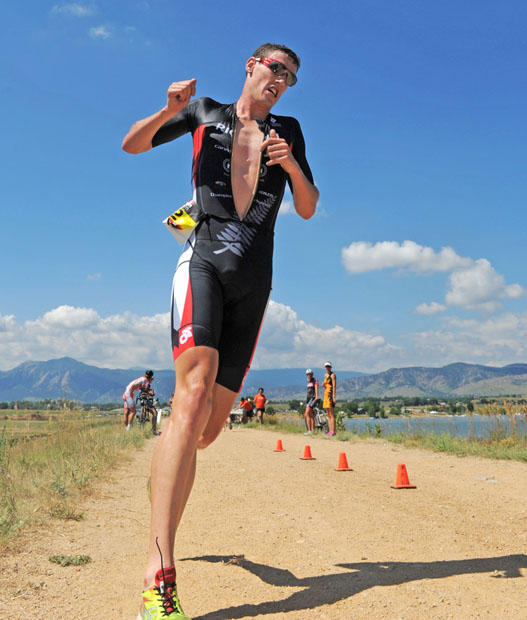
ST: Does your coach Nathan Richmond have a long term plan for you?
Mark: I have always wanted to do an Ironman. Nathan says he wants me to wait until I can fly the whole race. So he keeps holding me back. I know in my heart it is the smart thing to do, but… So yes we have a long term plan. I think the key for any triathlete is consistency – unless you are an absolute freak who picks it up very quickly. There are a few who have done it. For me it is consistency and just keeping at it for the time it takes.
ST: What is your base in New Zealand and here?
Mark: In New Zealand I am based at home on Waiuku, just 35 minutes south of Auckland. I am there from November to April. Then I come over to the States and do a few races off the bat like New Orleans and Wildflower. Then I come to Boulder where I live with Jimmy Seear which is a great setup. Jimmy is great to live with. We get along really well. He is a typical Australian – nice and chill. No dramas. And I really like going to Boulder. It feels like home now.
ST: Jimmy is developing a new product?
Mark: Yes his new business venture Ventum [cycles, which he partners with Diaa Nour] is quite interesting. I can’t wait to get there and take a look and hear more about it. Last year I was there during the development of his new company. They have tried to design the most aerodynamic bike. It is quite different. It does not have a down tube. I think it is a lot like the old Lotus. Very curvy. From what Jimmy he told me last year about the numbers in the wind tunnel it is seriously fast.
ST: Who helps them with it?
Mark: Jimmy’s dad is the engineer. I think they have employed or had help from people at places like Boeing. And they have top people riding it like Alicia Kaye and Leanda Cave.
ST: Do you have a personal life? Or are you completely devoted to swim-bike-run–eat-rest?
Mark: I am pretty bad at having a life outside of triathlon. I just don’t ever feel I have the time. I always feel I have to give it 100 percent, because I feel that is what it takes. I never feel I am talented enough to not give everything – now.
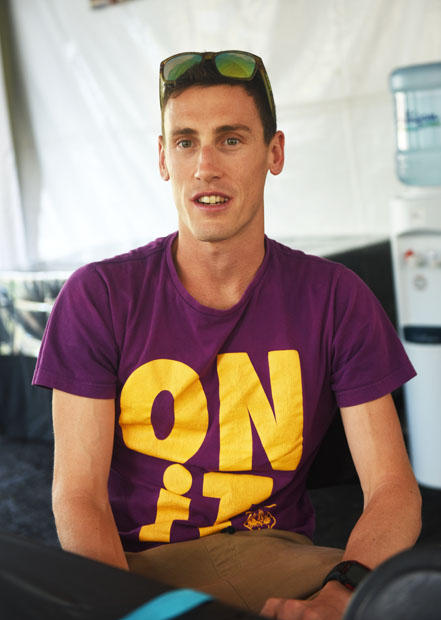
ST: What can you do long term?
Mark: Long term I still feel I am generally quite young. I feel I am among a few young guys on the verge of being more recognized.
ST: Such as?
Mark: Josh Amberger, Cody Beals, Andrew Yoder and, I guess, me. We are on the cusp of making some decent money. I am not there yet. This year I really hope to make a name for myself in the States. That is a lot harder to crack than the Southern Hemisphere. For example, I turn up at New Orleans and Wildflower and no one really knows who I am. In New Orleans I was ranked 19th and I got 6th – and went 3:44. The field was fast and seriously competitive. [At Wildflower, Bowstead finished 7th, 6:20 off the winner] This year is about making a name and trying to get some sponsors,
ST: Look at your brother James – he has equal ability and just encountered seriously bad luck. What do you think about his career?
Mark: James had some seriously bad luck. He was a better cyclist than me – seriously good. The unfortunate thing is he was often a two minutes slower swimmer. So he may not have stood out as much for being a great cyclist. With his swim he was always playing catch up. On the run, he was often injured – which was a shame. He has a huge engine.
ST: What were his injuries?
Mark: He has a labral tear in his left hip and an oversized bone in his right foot which displaced and damaged his peroneal tendons. He had surgery and tried for a year and half to come back and he did race pretty well. He raced Mandurah 70.3 and was 7th or 8th. And at Taupo, where I won, he got 3rd. It was good performance but that literally put him over the edge and he wasn't been able to run since.
ST: Might this be the end of his triathlon career?
Mark: James’ current status on tri I would say is along the lines of on hold. I would never say never as James’ biggest dream in life was to get to the start line in Kona to race the world champs. I have no doubt he would make it if his body allowed. So currently he is just giving his body a break and doing some ‘normal’ work. Which is running a 2XU pop up sale in Auckland NZ. He has managed the whole thing and seen it as a great learning curve. After that he wants to travel a bit to Europe and see the Tour de France and then probably come back and get into house building with my younger brother, Robert.
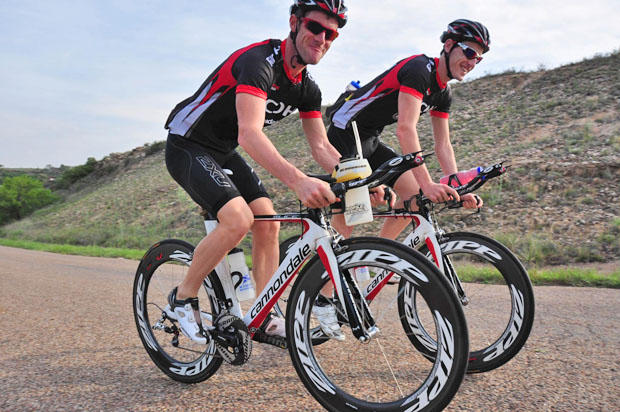
ST: Do you have a different approach to training?
Mark: James is probably the mentally toughest guy I have come across. He was willing to do whatever it takes. He would do 50k swim weeks, 1,000k bike weeks.
ST: Those are Hellriegel numbers.
Mark: He could do whatever it takes. I admire that because I am not sure that I can do as much as he did. Still, there is nothing that excites me more than a big week of training. Or even a big day. I find Friday easy swim and easy run days the hardest and often feel terrible.
ST: Any final thoughts?
Mark: I’d like to thank my sponsors: RICOH, 2XU, Cannondale (NZ), Zipp (NZ), Horleys, Asics.


